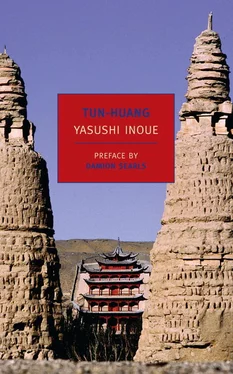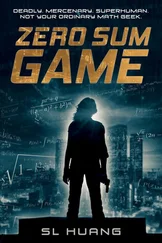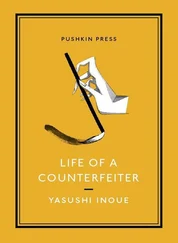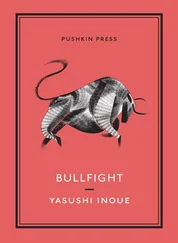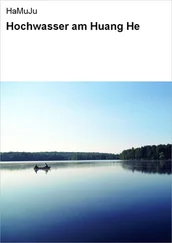The first message had been in Hsi-hsia, but the fact that this second one was in Chinese seemed to indicate that the Hsi-hsia writer had been among the three thousand casualties. Whether or not this was the case was beside the point. It was extremely difficult to make out from this message whether the situation was developing favorably or unfavorably for the Hsi-hsia army. However, the three thousand casualties mentioned at the end was an enormous number. Adding this to the five hundred casualties in the earlier report meant that Wang-li had lost four-fifths of his unit. The soldier who brought the message was one of the Kan-chou defense troops, and since he had not been sent directly from the front, Hsing-te could get no further information from him.
Wang-li’s third report came about three months later, at the beginning of November. This message was even briefer than the previous one and also written in Chinese.
“After more than two hundred days of fighting here and there on the frontiers, Chüeh-ssu-lo fled to the south. Our unit is on its way back. Yüan-hao’s main army is also proceeding toward Kua-chou.”
Hsing-to learned from this short message that Yüan-hao, who had routed Chüeh-ssu-lo from his main base after a prolonged, raging battle with the Turfans, was now advancing toward Kua-chou and Sha-chou with the remnants of his army.
The garrison, which had been peaceful until now, suddenly began to bustle with activity. Preparations had to be made for Wang-li’s victorious return and living quarters also had to be provided for the main Hsi-hsia army which was to follow. Hsing-te went to see Yen-hui and informed him of Wang-li’s message. In response, Yen-hui slowly creased the sagging muscles of his wrinkled face, and said, “That’s terrible! I thought they would come sometime. The day has finally arrived!”
It was hard to judge from Yen-hui’s expression whether he was happy or sad about it. Soon after, however, Hsing-te saw that Yen-hui trembled with sorrow and fear. Perhaps from agitation, Yen-hui moved his lips continuously, as though he were talking to himself. His voice was low.
“That’s why I said it. People think my brother, Hsien-shun, is extremely perceptive, but I think the opposite. This new development certainly proves my point. When Hsi-hsia took Su-chou, Hsien-shun should have negotiated with the Hsi-hsia as I did.”
Yen-hui stopped talking and stared vacantly into space, his expression unchanged for a while, and then said, “When I think about it, it won’t be an easy time. After Kua-chou, the Hsi-hsia with its large army will probably invade Sha-chou. Pagodas will be burned and temples destroyed. All the men will be drafted as soldiers, and the women used as servants. And there’s no doubt that all the Buddhist sutras will be taken away. That’s why I told him. Hsien-shun opposed me then, but he should have followed my example. He should have sent an envoy to Hsi-hsia. He must realize now how right I was.” Yen-hui seemed to be oblivious to Hsing-te’s presence and continued to talk as if alone.
Hsing-te thought Yen-hui was merely vexed with his brother, Governor Hsien-shun, and was relieving his anxiety a bit by speaking out like this, but he soon learned he was mistaken. Yen-hui rose and approached Hsing-te and said, “My brother will be killed. Sha-chou will be destroyed. The Buddhist caves in the Ming-sha mountains will be destroyed. The seventeen great temples will be burned, and the sutras will be taken away. The Chinese will be destroyed by Hsi-hsia.”
Hsing-te’s feelings were strange as he watched Yen-hui’s eyes fill with tears, which then rolled down his cheeks
As though trying to overtake his third message, Wang-li’s unit returned within ten days after the message. He had been gone for ten months. It was the middle of November, and the first hail of the season had fallen that day. The hail was the size of a man’s thumb, and the noise it made as it hit the ground was deafening. No one could go outdoors for even a moment while it was hailing.
Early that morning, a message had come from Wang-li to say the unit would reach Kua-chou by evening. Hsing-te was busy making preparations to greet them, and arranging accommodations for Yüan-hao’s Hsi-hsia army, which was due to follow Wang-li. As he had no idea how many troops would be coming, he had all the men in the garrison gather food from settlements around Kua-chou just in case. This work had to be stopped for a while because of the bad hail-storm.
Wang-li’s troops entered the city by Capital Gate, the one through which they had departed. The army of four and a half thousand was reduced to less than one thousand men. After ten camels or so loaded with whirlwind cannons had come through, Wang-li entered, also riding a camel, with the standards held up on both sides of him. Thirty cavalrymen followed. The rest were all infantry.
Hsing-te and Yen-hui both went outside the city gate to meet the forces and had a joyful reunion with the battle-weary commander. Wang-li appeared younger to Hsing-te. Perhaps it was because he had lost weight and become tanned, but Wang-li’s face and body looked firmer. He got off the camel and came up to Hsing-te and Yen-hui. His expression softened as he said something, but neither Hsing-te nor Yen-hui could understand him. Hsing-te brought his face close to Wang-li’s to try to make out what he was saying, but he still could not understand him. On his third attempt, Hsing-te was able to hear the broken, husky voice pushed up from deep within Wang-li’s throat.
“I returned without dying.” That was what Hsing-te thought he heard. Wang-li’s voice was so hoarse that it was barely audible.
Hsing-te took over Wang-li’s role, lined up the soldiers in the square, thanked them for their selflessness in the long, drawn-out battle, then served them food and wine. After the reception was over, the men were taken to their barracks.
From his seat at the reception, Wang-li could see the whole space and silently watched his men for a while. He then beckoned to Hsing-te and in the same hoarse voice said something else. Hsing-te had to ask Wang-li to repeat it many times, bringing his head as close as possible to the commander’s lips.
“The battle will start at noon tomorrow. Get Governor Yen-hui and all others in the town to take refuge.”
Hsing-te once more leaned toward Wang-li.
“Tomorrow Yüan-hao’s army will enter the city. I’m going to get that bastard. I’ll never have another chance like tomorrow.”
Hsing-te was completely taken aback. But after the first shock, he reflected that this turn of events was not so strange after all. This plan had undoubtedly been smouldering in Wang-li’s mind for a long time, and the moment for action had finally come. Only once before had Hsing-te seen Wang-li express his vindictiveness toward Yüan-hao. That had been during their march from Kan-chou to Su-chou, the day after the Uighur princess had thrown herself off the wall. Since then, Wang-li had not once mentioned the incident, but his hatred of Yüan-hao had continued to seethe inside him. And on their way from Su-chou to occupy Kua-chou, Wang-li had made an enigmatic statement about something he must do. Now Hsing-te realized that Wang-li had been referring to this plan.
“That bastard stole the woman and killed her. She was tortured for three days and nights before she finally consented to become Yüan-hao’s concubine, and at the end she died. That bastard, Yüan-hao, will now get what he deserves.” If Wang-li had been able to, he probably would have shouted it out, but this violent declaration of revenge was spoken in low, broken words.
“What was your relationship with her?” Hsing-te asked this question, which had been on his mind all this time, with resolution.
Читать дальше
